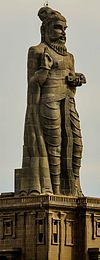Tirukkural translations into Odia
 From Wikipedia - Reading time: 8 min
From Wikipedia - Reading time: 8 min
| Part of a series on |
| Translation |
|---|
 |
| Types |
| Theory |
| Technologies |
| Localization |
| Institutional |
| Related topics |
|
By 2017, there were at least six translations of the Tirukkural in Odia, all published after the 1970s.
History of translations
[edit]The first translation of the Kural text in Odia appeared in 1978 by Chittaranjan Das, which was published by Bharatiya Vidya Bhavan in Bhubaneswar.[1][2] The list of Kural translations in Odia appears in the following table.[3]
| No. | Year | Translator | Title | Location and Publisher | Notes |
|---|---|---|---|---|---|
| 1 | 1978 | Chittaranjan Das[2][3] | Kural [Oriya] | Bhubaneswar: Bharatiya Vidya Bhavan | Appeared in 154 pages. |
| 2 | 1985 | Kshirod Dash[2][3] | Tirukkuralu | Sambalpur | A translations in verse |
| 3 | 1992 | Nityanada Acharya[2][3] | Tirukkural: Book of Sacred Couplets | Balangir, Orissa: Agragami Karyalaya | Translated only the first two parts (Virtue and Wealth) |
| 4 | 1994 | Gananath Das[2][3] | Cuttack: Vidyapuri Publishers | Complete translation in verse. Based on the Hindi translation of Tirukkural by M. G. Venkatakrishnan | |
| 5 | 1996 | Biswanath Misra[2][3] | Tirukkural | Bhubaneswar | |
| 6 | 2017 | Balaram Rout | Thirukkural | Delhi (Sahitya Akademi) |
G. N. Das's translation is based on the Hindi translation of the Tirukkural by M. G. Venkatakrishnan, and is also influenced by the English translations by P. S. Sundaram and Drew–Lazarus and Sanskrit translation by S. N. Srirama Desikan.[4][5] Das retired from his IAS career in 1972, after which he took to studying saintly literatures, especially that of Kabir.[6] In 2017, Balaram Rout made another translation, which was published by Sahitya Akademi in Delhi.
In 2022, as part of its Ancient Tamil Classics in Translations series, the Central Institute of Classical Tamil (CICT) in Chennai released its Odia translation of the Kural by Giribala Mohanty.
See also
[edit]Citations
[edit]- ^ Tamilselvan et al., 2017, pp. 30–31.
- ^ a b c d e f Polilan; K. Gunathogai; Lena Kumar; Tagadur Sampath; Mutthamizh; G. Picchai Vallinayagam; D. Anbunidhi; K. V. Neduncheraladhan, eds. (2019). Tiruvalluvar 2050 (in Tamil) (1 ed.). Chennai: Periyar Enthusiasts Group. p. 682.
- ^ a b c d e f Tamilselvan et al., 2017, pp. 30–37.
- ^ Tamilselvan et al., 2017, pp. 31–32.
- ^ Sundararajan, S. (1997). Foreword. In: Thirukkural in Oriya (G. N. Das, Trans.) (in Odia). Cuttack: Vidyapuri. pp. vii.
- ^ "Thirukkural in Oriya". OOCities. Retrieved 22 April 2017.
References
[edit]- Tamilselvan, R.; Manimala, J.; Murali, M.; Mathan, V. P. S.; Amirtharaj, T. Vijay (2017). உலக மொழிகளில் திருக்குறள் மொழிபெயர்ப்புகள் [Tirukkural translations in world languages] (1st ed.). Chennai: Kaavya. ISBN 978-93-86576-35-4.
Published Translations
[edit]- G. N. Das. (1997). Thirukkural in Oriya (Foreword by S. Sundararajan). Cuttack: Vidyapuri.
 KSF
KSF